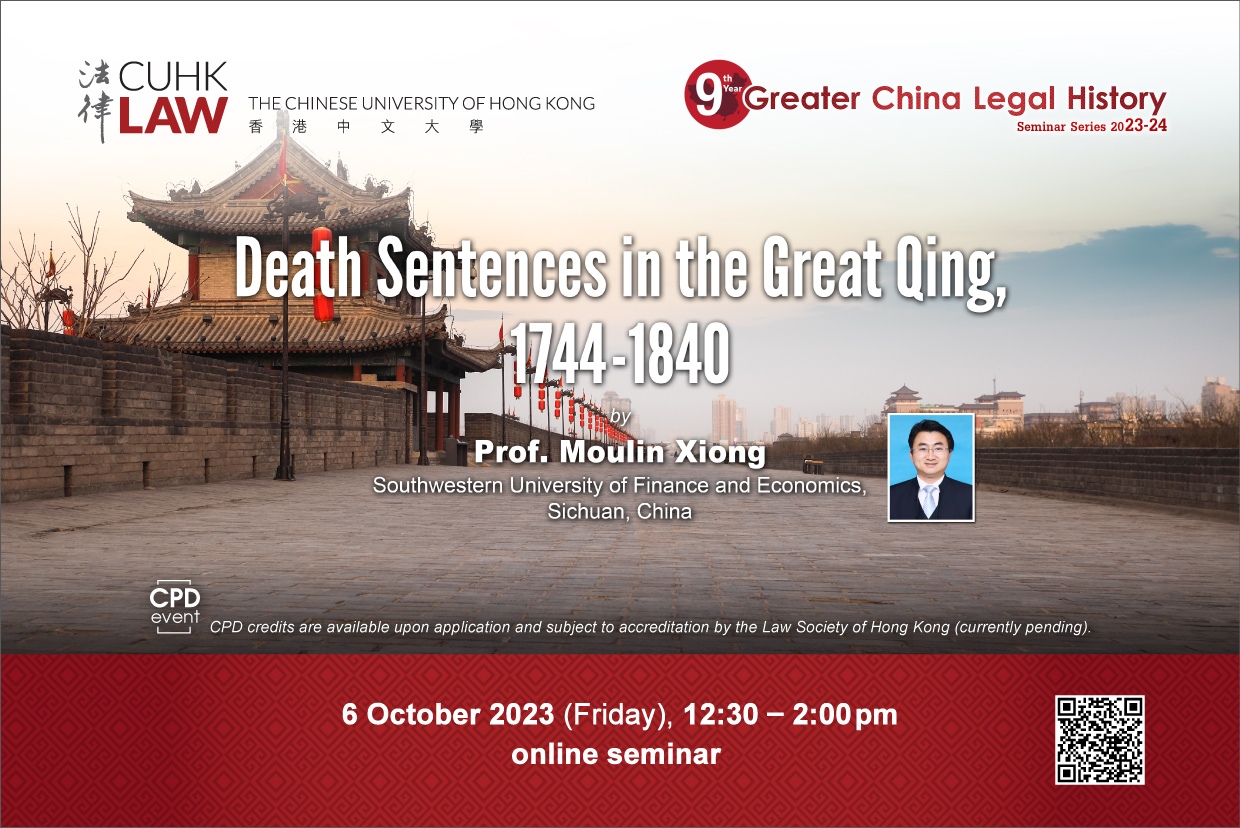Events
CUHK LAW Greater China Legal History Seminar Series – ‘Death Sentences in the Great Qing, 1744-1840’ by Prof. Moulin Xiong (Online)
6 Oct 2023
12:30pm – 2:00pm
Online via ZOOM
Professor Moulin Xiong
Moulin Xiong is Chair and Professor of Institute of Criminal Law at Law School of Southwestern University of Finance and Economics, whilst he has been appointed the Guanghua Intellectual by SWUFE in 2022. He is also an adjunct lawyer in a law office in Chengdu, specializing in defense for the innocent and death sentenced defendants. He completed his Ph.D. at SWUFE in 2012, whilst he was trained at Sociology Department of University of California, Irvine as a Visiting Scholar between 2010 and 2012. He is Member of General Assembly of Asian Criminology Society, and a founding member of the Association of Chinese Criminology and Criminal Justice in the United States. With cross-subject interests, he currently develops diverse topics in criminal law, legal history, quantitative criminology and sociology, and empirical legal studies, and wrongful conviction and capital punishment are the most important interests in his academic life.
Over the last centuries, the view on the death penalty in Qing China has been distorted, presenting a picture of abusive brutality and excessive cruelty, and thus was used as the critical pretext to establish immune extraterritorial jurisdictions. Nevertheless, the existing comments are more literary embellishments without empirical evidence, and few comparative and historical perspectives have been utilized to clarify the truth.
In this study, we mined annual death sentence numerical data for the period 1744 to 1840 from official archives and literatures, deciphering the capital crimes in detail and ascertaining the longitudinal trend with population statistics. To reassess the profile of capital law and justice, we carefully reviewed the previous literatures and conducted a comparative analysis of key aspects in Qing China and in England and Wales. Using multiple analytical strategies, the study revealed the following in Qing China:
(a) about 20% of death sentence cases resulted in execution and 80% in suspended or nominal sentences;
(b) on average, 3183.78 cases were death sentences in a country with a population of about 400 million;
(c) the death sentence rate steadily decreased from 1.20 to 0.73 per 100,000 population; and
(d) the majority of capital crimes concerned homicides and killings in fights, while only about 10% involved robbery.
During the same period, England and Wales were bloody codeless countries with death sentence and execution rates that were at least three to nine times higher than in Qing China, and capital crimes mainly involved property crimes. This study’s conclusion, therefore, is that Qing China was very lenient in terms of codification and capital justice in comparison with England and Wales. Flowing with “anti anti-orientalism”, we argue that the erroneous picture should be discarded and appeal for historical China’s contribution to the heritage of global law and justice to be recognized.
Language: English
CPD credits are available upon application and subject to accreditation by the Law Society of Hong Kong (currently pending).


